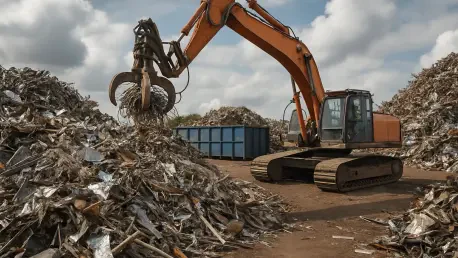In an industry where sustainability and operational efficiency are paramount, Steel Dynamics Inc. (SDI), based in Fort Wayne, Indiana, has made a pivotal move by appointing Matt Bell as Vice President of Metals Recycling and President of OmniSource. This decision, announced on November 12 of this year, has sparked widespread discussion among industry stakeholders about the future of metals recycling and leadership strategies in industrial metals solutions. With recycling playing a critical role in sustainable steel production, how will this appointment shape SDI’s trajectory? This roundup gathers opinions, analyses, and tips from various industry perspectives to explore the implications of Bell’s elevation and what it signals for the broader sector.
Diverse Perspectives on Bell’s Appointment
Industry Reactions to a Strategic Promotion
Across the industrial metals landscape, reactions to Matt Bell’s appointment have been largely positive, with many viewing it as a testament to SDI’s focus on internal talent development. Several industry observers note that Bell’s journey with SDI since joining in 2016, coupled with his impactful tenure as Vice President of Commercial at OmniSource since 2023, positions him as a seasoned leader ready to tackle the complexities of scrap metal markets. His track record in enhancing ferrous purchasing strategies has been highlighted as a key strength that could drive operational stability.
However, not all feedback is uniformly optimistic. Some analysts caution that while internal promotions ensure continuity, they may limit fresh perspectives needed to address emerging challenges like integrating cutting-edge recycling technologies. This divergence in opinion underscores a broader debate about balancing familiarity with innovation in leadership roles within highly specialized sectors like metals recycling.
A third viewpoint emphasizes the timing of this shift, suggesting that SDI’s decision reflects a proactive stance amid growing sustainability demands. Commentators in this camp argue that Bell’s deep understanding of supply chain optimization could be instrumental in aligning SDI’s recycling efforts with global environmental goals, potentially setting a benchmark for competitors.
Leadership Experience Under the Spotlight
Focusing on Bell’s credentials, many industry voices commend his extensive experience both within SDI and prior to joining the company, where he held significant roles in metals recycling. His progression through operations, commercial strategies, and marketing is seen as a robust foundation for overseeing OmniSource’s critical role as a raw material supplier for SDI’s steel operations. This perspective holds that such a well-rounded background equips him to navigate volatile market conditions effectively.
Contrasting opinions, however, point to potential hurdles Bell might face, such as managing competitive pressures in an increasingly crowded recycling space. Some industry watchers suggest that while his expertise is undeniable, the scale of responsibility in his new role could test his ability to balance operational demands with strategic growth initiatives. This concern highlights the high stakes tied to leadership in a sector integral to sustainable industrial practices.
Another angle of analysis focuses on the endorsement from SDI’s leadership, particularly CEO Mark D. Millett’s praise for Bell’s contributions to service improvement and efficiency. Industry commentators interpret this as a strong internal vote of confidence, suggesting that such backing could empower Bell to implement bold strategies, potentially reshaping how SDI approaches scrap supply chain management over the coming years.
Strategic Implications for SDI and Beyond
Strengthening the Recycling Framework
Insights gathered from various industry sources underscore the strategic importance of Bell’s role in fortifying OmniSource’s position within SDI’s ecosystem. Many agree that his prior success in driving sales growth strategies could enhance the seamless flow of scrap materials to steel operations, a critical factor in maintaining production consistency. This perspective sees his leadership as a linchpin for operational resilience.
On the flip side, some voices express concern over external risks, such as supply chain disruptions or fluctuating scrap prices, which could challenge even the most experienced leaders. These commentators argue that while Bell’s internal achievements are notable, external market dynamics might require adaptive approaches beyond current strategies. This viewpoint calls for cautious optimism regarding immediate impacts.
A balanced take from other industry observers suggests that this appointment offers SDI an opportunity to solidify its market edge by leveraging Bell’s expertise in streamlining processes. They propose that focusing on innovative recycling solutions under his guidance could position SDI as a frontrunner in sustainable steel production, urging other firms to take note of such leadership alignment as a competitive advantage.
Succession Planning as a Broader Trend
The trend of internal promotions, as exemplified by SDI’s move, garners significant attention in this roundup. Many industry professionals view succession planning as a strategic tool that fosters continuity and leverages deep organizational knowledge, reducing the learning curve associated with external hires. This opinion holds that SDI’s approach could inspire similar practices across industrial giants.
Differing views caution against over-reliance on internal talent, arguing that fresh external perspectives can sometimes catalyze innovation more effectively. These critics point out that while Bell’s elevation is promising, industries facing rapid technological shifts might benefit from leaders with diverse, outside experiences to challenge entrenched practices.
A nuanced perspective combines both sides, suggesting that SDI’s strategy of pairing internal promotions with cross-divisional mobility—evidenced by Miguel Alvarez’s transition to lead the aluminum flat rolled products platform—demonstrates adaptability. This approach, according to some analysts, balances the benefits of familiarity with the need for versatility, potentially setting a new standard for leadership structuring in metals recycling.
Tips for Industry Players Inspired by SDI’s Move
Investing in Talent Development
Drawing from the discourse surrounding Bell’s appointment, a recurring tip for industrial firms is to prioritize robust talent development programs. Many industry voices advocate for identifying and nurturing high-potential employees early, ensuring a pipeline of leaders familiar with company operations. This strategy, they argue, mirrors SDI’s success in grooming leaders like Bell for critical roles.
Another practical suggestion focuses on creating structured pathways for career progression within niche sectors like recycling. Commentators emphasize that offering clear advancement opportunities can boost employee morale and retention, ultimately strengthening organizational stability. This advice targets firms aiming to replicate SDI’s internal growth model.
A complementary tip highlights the value of mentorship within such programs, with some suggesting that pairing emerging leaders with seasoned executives can accelerate skill development. This approach, inspired by SDI’s apparent confidence in Bell’s readiness, could help other companies build a resilient leadership cadre capable of addressing industry-specific challenges.
Prioritizing Operational Expertise in Leadership
Another key takeaway from this roundup is the importance of elevating leaders with hands-on operational experience to executive roles. Many industry opinions stress that leaders like Bell, with deep roots in day-to-day processes, are better equipped to make informed strategic decisions that impact production and efficiency directly.
A contrasting tip warns against focusing solely on operational backgrounds, urging firms to also consider commercial acumen when selecting leaders. Some voices argue that while operational expertise is vital, a balance with market-driven insights ensures leaders can navigate both internal workflows and external competitive landscapes effectively.
Lastly, a broader recommendation is for companies to assess leadership needs in the context of sustainability goals, particularly in recycling-focused divisions. Industry perspectives suggest that aligning leadership appointments with long-term environmental objectives, as SDI appears to do, can enhance a firm’s reputation and market positioning over time.
Reflecting on the Roundup’s Key Takeaways
Looking back on the discussions captured in this roundup, the appointment of Matt Bell as Vice President of Metals Recycling at Steel Dynamics Inc. sparked a rich dialogue among industry stakeholders. The insights revealed a spectrum of optimism about his proven expertise and SDI’s strategic focus on internal talent, tempered by valid concerns over external market challenges and the need for innovative perspectives. As firms reflected on this move, actionable strategies emerged, from investing in talent pipelines to prioritizing operational leaders for executive roles. Moving forward, companies should consider benchmarking their leadership approaches against such examples, exploring how strong guidance in niche sectors like recycling can drive broader success. Additionally, staying attuned to industry trends through ongoing analysis and adaptation will be crucial for maintaining a competitive edge in the evolving industrial metals landscape.









